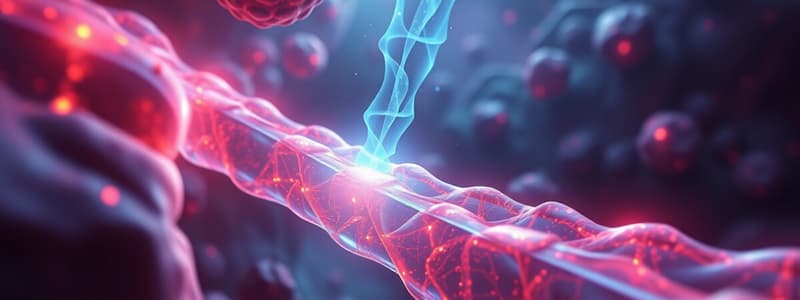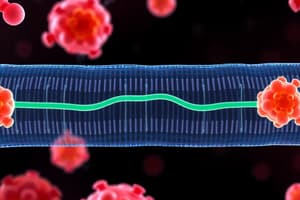Podcast
Questions and Answers
What is the characteristic of the plasma membrane?
What is the characteristic of the plasma membrane?
- Is selectively permeable (correct)
- Is always impermeable
- Is permanently permeable
- Is impermeable to all substances
What does it mean when something is described as differentially permeable?
What does it mean when something is described as differentially permeable?
Certain substances can move across the plasma membrane while others cannot.
An impermeable membrane allows any substances to pass through.
An impermeable membrane allows any substances to pass through.
False (B)
What is meant by a permeable membrane?
What is meant by a permeable membrane?
What is the permeability of the plasma membrane?
What is the permeability of the plasma membrane?
Which type of molecules can move freely across the cell membrane?
Which type of molecules can move freely across the cell membrane?
Define passive transport.
Define passive transport.
What factors affect the rate of diffusion?
What factors affect the rate of diffusion?
Osmosis refers to the diffusion of solutes.
Osmosis refers to the diffusion of solutes.
What happens in a hypotonic solution?
What happens in a hypotonic solution?
What is turgor pressure?
What is turgor pressure?
What is crenation?
What is crenation?
Flashcards are hidden until you start studying
Study Notes
Plasma Membrane
- The plasma membrane is differentially or selectively permeable, allowing certain substances to move across while restricting others.
Permeability Types
- Impermeable: No substances can pass through the plasma membrane.
- Permeable: All substances can pass through the plasma membrane.
Key Characteristics of Permeability
- The permeability of the plasma membrane permits some substances, like small, uncharged molecules (e.g., CO2, O2, H2O, glycerol, alcohol), to move freely, whereas larger molecules, ions, and charged species require assistance.
Transport Mechanisms
- Passive Movement: Some substances can move across the plasma membrane freely, following their concentration gradient from high to low.
- Active Transport: May require carrier proteins and ATP (energy) for movement across the membrane.
Molecule Types
- Small/Uncharged Molecules: Move freely across membranes and follow concentration gradients.
- Large/Charged Molecules: Cannot cross without assistance, using protein channels and carrier proteins.
Vesicle Formation
- Molecules can exit (exocytosis) or enter (endocytosis) cells via vesicle formation, typically for macromolecules.
Diffusion
- Defined as the movement of molecules from higher to lower concentration until equilibrium is reached, e.g., gases like oxygen and carbon dioxide can diffuse across the plasma membrane.
Factors Affecting Diffusion Rate
- Influenced by temperature, pressure gradient, concentration gradient, molecular size, charge, and electrical currents.
Osmosis
- Refers to the diffusion of water from areas of high water concentration to low water concentration.
Osmotic Pressure
- The pressure that builds due to osmosis; higher osmotic pressure indicates a greater tendency for water to diffuse in that direction.
Solutions and Concentration
- Isotonic Solutions: Solute concentration is equal inside and outside the cell; no net water movement.
- Hypotonic Solutions: Lower solute concentration outside; cells can gain water, swell, or burst (cytolysis).
- Hypertonic Solutions: Higher solute concentration outside; cells lose water, shrink or shrivel up (crenation).
Turgor Pressure
- The pressure exerted by plant cell contents against the cell wall due to water influx, preventing cell bursting.
Freshwater Organisms
- Use contractile vacuoles to regulate internal environments and prevent excess water uptake.
Plasmolysis
- Occurs when cells lose water in hypertonic solutions, causing contraction of cell contents; marine animals employ adaptations to retain water.
Studying That Suits You
Use AI to generate personalized quizzes and flashcards to suit your learning preferences.




